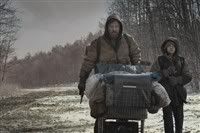 Batman in Barcelona: Dragon's Blood #1
Batman in Barcelona: Dragon's Blood #1 Written by Mark Waid
Art by Diego Olmos
The inmates at Arkham are manipulative psychopaths who have never hesitated to torture whomever they chose; even one of their own. After being manipulated by Mad Hatter and Scarecrow, Killer Croc runs off to Barcelona in an effort to reenact the legend of St. George and the Dragon with the Dark Knight-- but with the Dragon claiming victory. Croc has been killing relentlessly, a young woman each night, and as the festival for St. George draws near it seems that Croc might do something extreme if he doesn't get the confrontation he's after.
First I have to say that I've never disliked Mark Waid. Kingdom Come was quite the bit of writing, and his run on Fantastic Four is still something I think of fondly, but still it was only with mild optimism that I approached this title. Despite this, Batman in Barcelona is still an inexcusable dud that I wish I hadn't waited my time on. When this one-shot was announced, I initially brushed it aside and thought that it would be just an empty killer croc story, devoid of anything of real value, and should have stuck with my first impression.
One of the more notable problems is how familiar certain elements of this story seem. Two scenes in particular-- and horribly enough the two that make up most of the soul of this piece, are total rip offs of other pieces of Batman lore. One scene in the story will strike the reader as overwhelmingly familiar because it is nearly pound for pound exactly like a scene from Batman Begins, and another will strike readers as a rip off of Morrison's Arkham Asylum which this story could well have been conceived from. Finally, there's the ending which reeks of a sappy romance movie. In short, the scenes that would have made this comic something of note are completely unoriginal, and derive from other Batman sources. If I were Waid, I'd be hanging my head in shame to do anything so obvious.
Another huge problem in this comic are the huge gaps in logic. The Barcelona public has no idea who Batman is-- a fact that would be fine, except that Batman is as much as a world icon in the DC universe as he is in our own. He's a member of the justice league-- he's helped saved the world. How can I be expected to believe that the people of Barcelona (more than just one person mind you) don't know who he is? One woman called Batman a "demon" in the issue. Ok, maybe there are people who don't know who Batman is but how the hell do you mistake a man in a suit, one foot away from you, as a demon? Additionally, this entire comic is based on the premise that Killer Croc has managed to get to Barcelona. Can someone explain to be how a 7 foot tall, prisoner escapee lizard man boarded a plane or boat unnoticed? It also expects the reader to believe that Bruce Wayne has mini-Batcaves all over the world. I'm not usually one to scoff and Bruce Wayne's paranoia but c'mon.
Even the dialog was bad. It was as though Waid had no grip on how to write a dark character like Batman. His lines always go on for too long, and characters address each other and refer to each other in contrived ways. It was simply painful to read. The art is also unredeeming. While the pages are generally well-rendered, it's often challenging to follow the action within the comic, and characters frequently have an awful stiffness to them. Olmos might be able to do fantastic pin-ups or covers, but I wouldn't want him drawing my comic.
RATING: 1 out of 10.
Worthless. Buy it if your life is just going too well and you need something to bitch about. Sorry about the review being late, but comics didn't hit the store until late Thursday.













